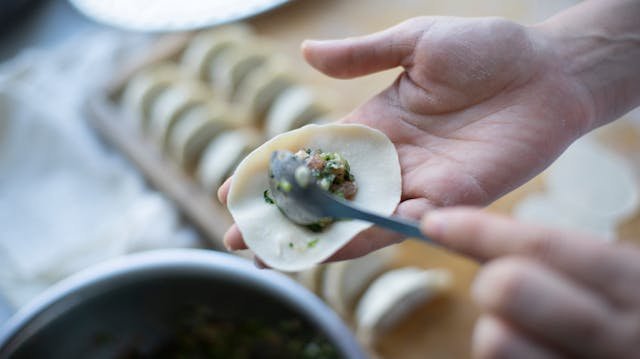Dumplings, or 饺子 (jiǎozi), hold a cherished place in Chinese cuisine and culture. Their history dates back thousands of years, and they are considered a symbol of wealth and prosperity. But how do dumplings intersect with the modern concept of persona, particularly in the realm of social interactions and entertainment? Let’s explore this fascinating combination and understand how these delicious treats can enhance your social persona.
Table of Contents
ToggleA Bite into History
Dumplings are believed to have originated during the Eastern Han Dynasty (25-220 AD), invented by the medical saint Zhang Zhongjing. According to legend, Zhang filled small dough wrappers with mutton, herbs, and other ingredients to help ward off cold and illness during the harsh winter months. This creation, known as 饺子 (jiǎozi), quickly became popular due to its delicious taste and health benefits.
Over time, 饺子 evolved, with different regions in China developing their own variations. Northern China, for example, is famous for its boiled dumplings, while southern China is known for its steamed and pan-fried varieties. Each type of dumpling tells a story about the region’s history, culture, and culinary preferences.
The Journey of Dumplings Through the Dynasties
During the Tang and Song Dynasties, dumplings became more elaborate, with fillings incorporating a wider variety of ingredients, reflecting the prosperity and cultural exchange of the times. By the Ming and Qing Dynasties, dumplings had solidified their role in festive celebrations, particularly during the Lunar New Year.
Dialogue: The Evolution of Dumplings
Host: 你们知道饺子是怎么演变的吗? (Nǐmen zhīdào jiǎozi shì zěnme yǎnbiàn de ma?) “Do you know how dumplings have evolved?”
Guest: 不知道,请告诉我们!(Bù zhīdào, qǐng gàosù wǒmen!) “I don’t know, please tell us!”
Host: 饺子起源于东汉时期,当时是一种药膳。后来,随着时间的推移,各个朝代加入了不同的食材和烹饪方法,使饺子更加美味。 (Jiǎozi qǐyuán yú Dōng Hàn shíqí, dāngshí shì yī zhǒng yàoshàn. Hòulái, suízhe shíjiān de tuīyí, gège cháodài jiārùle bùtóng de shícái hé pēngrèn fāngfǎ, shǐ jiǎozi gèng jiā měiwèi.) “Dumplings originated during the Eastern Han period as a medicinal dish. Over time, different dynasties added various ingredients and cooking methods, making dumplings even more delicious.”
The Cultural Significance of Dumplings
Dumplings are a staple in Chinese festivals, especially during the Chinese New Year. They symbolize wealth and prosperity because their shape resembles ancient Chinese gold and silver ingots. The process of making dumplings is often a family affair, fostering bonding and cooperation among family members. Dumplings are also eaten during the Winter Solstice (冬至, dōngzhì) to celebrate the longer days and the coming of spring.
Dialogue: The Importance of Dumplings in Chinese Festivals
Host: 你们知道为什么我们过年要吃饺子吗? (Nǐmen zhīdào wèishéme wǒmen guònián yào chī jiǎozi ma?) “Do you know why we eat dumplings during the New Year?”
Guest: 不知道,请告诉我们! (Bù zhīdào, qǐng gàosù wǒmen!) “I don’t know, please tell us!”
Host: 因为饺子的形状像古代的金元宝,所以吃饺子象征着招财进宝。 (Yīnwèi jiǎozi de xíngzhuàng xiàng gǔdài de jīn yuánbǎo, suǒyǐ chī jiǎozi xiàngzhēng zhe zhāo cái jìn bǎo.) “Because the shape of dumplings resembles ancient gold ingots, eating them symbolizes attracting wealth and treasure.”
Persona in Chinese Culture
The concept of “persona” in Chinese culture can be understood through the idiom 面子 (miànzi), which means “face” or “reputation.” Maintaining face is crucial in Chinese social interactions, reflecting one’s dignity, respect, and social standing. By hosting a dumpling-making event, you can enhance your social persona, demonstrating hospitality, culinary skill, and cultural appreciation.
The Art of Maintaining Face
In Chinese culture, 面子 (miànzi) is more than just a superficial concept. It encompasses one’s honor, respect, and social status. Losing face (丢面子, diū miànzi) can be a significant social setback, while giving face (给面子, gěi miànzi) to others through respect and recognition strengthens social bonds.
Dialogue: Discussing Face in Chinese Culture
Host: 在中国文化中,面子非常重要。 (Zài Zhōngguó wénhuà zhōng, miànzi fēicháng zhòngyào.) “In Chinese culture, face is very important.”
Guest: 什么是面子? (Shénme shì miànzi?) “What is face?”
Host: 面子是指一个人的尊严和声誉。我们通过尊重和认可他人来保持面子。 (Miànzi shì zhǐ yīgè rén de zūnyán hé shēngyù. Wǒmen tōngguò zūnzhòng hé rènkě tārén lái bǎochí miànzi.) “Face refers to a person’s dignity and reputation. We maintain face by respecting and recognizing others.”
Hosting a Dumpling-Making Party
A dumpling-making party is an excellent way to bring friends and family together, showcasing your culinary skills and cultural knowledge. Here’s a step-by-step guide to hosting a successful dumpling-making party that will leave a lasting impression on your guests:
Invitations
Send out invitations with a warm message in Chinese, such as:
亲爱的朋友们 (Qīn’ài de péngyǒumen), 请来参加我们的饺子制作派对!(Qǐng lái cānjiā wǒmen de jiǎozi zhìzuò pàiduì!) 期待与你们共度美好时光。(Qīdài yǔ nǐmen gòngdù měihǎo shíguāng.)
“Dear friends, Please join us for our dumpling-making party! Looking forward to spending wonderful time with you all.”
Setting the Scene
Decorate your home with traditional Chinese elements such as 红灯笼 (hóng dēnglóng, red lanterns) and 对联 (duìlián, couplets). Play some traditional Chinese music to set the mood. Consider placing a round table (圆桌, yuánzhuō) in the center, as the round shape symbolizes unity and togetherness.
Ingredients and Preparation
Prepare the following ingredients:
- Dumpling wrappers (饺子皮, jiǎozi pí)
- Ground pork (猪肉, zhūròu)
- Chopped vegetables (蔬菜, shūcài)
- Soy sauce (酱油, jiàngyóu)
- Sesame oil (香油, xiāngyóu)
- Ginger (姜, jiāng)
- Garlic (蒜, suàn)
- Green onions (葱, cōng)
- Chinese cabbage (白菜, báicài)
- Shrimp (虾, xiā) – optional for seafood dumplings
Preparation Process
Start by preparing the filling. This can be a collaborative effort, where everyone pitches in to chop, mix, and season the ingredients.
Dialogue: Preparing the Filling
Host: 大家好!今天我们来学做饺子。首先,我们来准备馅料。(Dàjiā hǎo! Jīntiān wǒmen lái xué zuò jiǎozi. Shǒuxiān, wǒmen lái zhǔnbèi xiànliào.) “Hello everyone! Today we are going to learn how to make dumplings. First, let’s prepare the filling.”
Guest 1: 太好了!我们需要哪些材料?(Tài hǎole! Wǒmen xūyào nǎxiē cáiliào?) “Great! What ingredients do we need?”
Host: 我们需要猪肉、白菜、葱、姜、蒜、酱油和香油。(Wǒmen xūyào zhūròu, báicài, cōng, jiāng, suàn, jiàngyóu hé xiāngyóu.) “We need pork, cabbage, green onions, ginger, garlic, soy sauce, and sesame oil.”
Guest 2: 好的,我来切菜。(Hǎo de, wǒ lái qiē cài.) “Okay, I’ll chop the vegetables.”
Host: 然后,我们把切好的蔬菜和肉混合在一起,加上调料。(Ránhòu, wǒmen bǎ qiē hǎo de shūcài hé ròu hùnhé zài yīqǐ, jiā shàng tiáoliào.) “Then, we mix the chopped vegetables and meat together and add the seasonings.”
Guest 3: 我可以来包饺子吗?(Wǒ kěyǐ lái bāo jiǎozi ma?) “Can I wrap the dumplings?”
Host: 当然可以!我们先把饺子皮放平,然后放一小勺馅料在中间。(Dāngrán kěyǐ! Wǒmen xiān bǎ jiǎozi pí fàng píng, ránhòu fàng yī xiǎo sháo xiànliào zài zhōngjiān.) “Of course! First, we lay the dumpling wrapper flat, then put a small spoonful of filling in the center.”
Guest 1: 接下来怎么做?(Jiē xiàlái zěnme zuò?) “What do we do next?”
Host: 接下来,我们把饺子皮对折,然后捏紧边缘,像这样。(Jiē xiàlái, wǒmen bǎ jiǎozi pí duìzhé, ránhòu niē jǐn biānyuán, xiàng zhèyàng.) “Next, we fold the wrapper in half and pinch the edges tightly, like this.”
Guest 2: 我试试,看我做得对不对。(Wǒ shì shì, kàn wǒ zuò de duì bù duì.) “Let me try and see if I am doing it right.”
Cooking Methods
Once the dumplings are wrapped, it’s time to cook them. You can boil (煮, zhǔ), steam (蒸, zhēng), or pan-fry (煎, jiān) the dumplings. Each method has its unique flavor and texture, offering a variety of experiences from the same base ingredient.
Dialogue: Cooking Methods Explained
Host: 我们现在来煮饺子。把水烧开,然后把饺子放进去,煮到它们浮起来就熟了。(Wǒmen xiànzài lái zhǔ jiǎozi. Bǎ shuǐ shāo kāi, ránhòu bǎ jiǎozi fàng jìnqù, zhǔ dào tāmen fú qǐlái jiù shúle.) “Now let’s boil the dumplings. Bring the water to a boil, then put the dumplings in. Cook them until they float, then they are done.”
Guest 1: 那蒸饺子呢?(Nà zhēng jiǎozi ne?) “What about steaming the dumplings?”
Host: 蒸饺子很简单,把饺子放在蒸笼里,蒸大约十分钟。(Zhēng jiǎozi hěn jiǎndān, bǎ jiǎozi fàng zài zhēnglóng lǐ, zhēng dàyuē shí fēnzhōng.) “Steaming dumplings is easy. Put the dumplings in the steamer and steam for about ten minutes.”
Guest 2: 我喜欢煎饺子,怎么煎?(Wǒ xǐhuān jiān jiǎozi, zěnme jiān?) “I like pan-fried dumplings. How do we pan-fry them?”
Host: 煎饺子要先在锅里放一点油,加热后放入饺子,煎到底部金黄,然后加点水盖上锅盖焖熟。(Jiān jiǎozi yào xiān zài guō lǐ fàng yīdiǎn yóu, jiārè hòu fàng rù jiǎozi, jiān dào dǐbù jīn huáng, ránhòu jiā diǎn shuǐ gài shàng guō gài mèn shú.) “To pan-fry dumplings, first put some oil in the pan. Heat it up, then add the dumplings. Fry until the bottom is golden, then add some water, cover the pan, and let them steam until cooked through.”
Enjoying the Dumplings
After cooking, serve the dumplings with a variety of dipping sauces, such as soy sauce (酱油, jiàngyóu), black vinegar (黑醋, hēi cù), and chili oil (辣椒油, làjiāo yóu). Encourage your guests to try different combinations and share their thoughts.
Dialogue: Sharing and Enjoying Dumplings
Guest 1: 饺子真好吃!(Jiǎozi zhēn hǎochī!) “The dumplings are delicious!”
Host: 谢谢!有句俗话说:“好吃不过饺子。” (Xièxiè! Yǒu jù súhuà shuō: “Hǎochī bùguò jiǎozi.”) “Thank you! There’s a saying that goes: ‘Nothing is as delicious as dumplings.'”
Guest 2: 你们过年时还做什么?(Nǐmen guònián shí hái zuò shénme?) “What else do you do during the New Year?”
Host: 我们还会放鞭炮,贴春联,给小孩发红包。(Wǒmen hái huì fàng biānpào, tiē chūnlián, gěi xiǎohái fā hóngbāo.) “We also set off firecrackers, paste couplets, and give red envelopes to children.”
Enhancing Your Persona through Dumplings
By hosting a dumpling-making event, you are not only sharing a beloved culinary tradition but also demonstrating key aspects of a positive social persona in Chinese culture. This includes:
- 热情好客 (rèqíng hǎokè): Hospitality
- 团结合作 (tuánjié hézuò): Unity and cooperation
- 文化欣赏 (wénhuà xīnshǎng): Cultural appreciation
- 手艺精湛 (shǒuyì jīngzhàn): Skilled craftsmanship
The Benefits of Sharing Cultural Practices
Hosting such an event highlights your respect for Chinese traditions and showcases your willingness to share and celebrate cultural diversity. This approach will enhance your reputation (声誉, shēngyù) and foster stronger social connections (社会联系, shèhuì liánxì).
Dialogue: Reflecting on the Experience
Host: 今天的饺子制作派对真是太棒了!(Jīntiān de jiǎozi zhìzuò pàiduì zhēnshi tài bàng le!) “Today’s dumpling-making party was fantastic!”
Guest 1: 是的,我学到了很多,也玩得很开心。(Shì de, wǒ xué dàole hěn duō, yě wán de hěn kāixīn.) “Yes, I learned a lot and had a great time.”
Guest 2: 谢谢你邀请我们,期待下次再聚!(Xièxiè nǐ yāoqǐng wǒmen, qīdài xiàcì zài jù!) “Thank you for inviting us. Looking forward to the next gathering!”
Host: 不客气!下次我们可以试试做其他中国菜。(Bù kèqì! Xiàcì wǒmen kěyǐ shìshì zuò qítā Zhōngguó cài.) “You’re welcome! Next time, we can try making other Chinese dishes.”
Wordlist
Here is a list of key Chinese vocabulary and expressions to help you along the way:
| English | Chinese (Simplified) | Pinyin |
|---|---|---|
| Dumplings | 饺子 | jiǎozi |
| Dumpling wrapper | 饺子皮 | jiǎozi pí |
| Ground pork | 猪肉 | zhūròu |
| Vegetables | 蔬菜 | shūcài |
| Soy sauce | 酱油 | jiàngyóu |
| Sesame oil | 香油 | xiāngyóu |
| Ginger | 姜 | jiāng |
| Garlic | 蒜 | suàn |
| Green onions | 葱 | cōng |
| Chinese cabbage | 白菜 | báicài |
| Shrimp | 虾 | xiā |
| Boil | 煮 | zhǔ |
| Steam | 蒸 | zhēng |
| Pan-fry | 煎 | jiān |
| Red lantern | 红灯笼 | hóng dēnglóng |
| Couplets | 对联 | duìlián |
| Face (reputation) | 面子 | miànzi |
| Hospitality | 热情好客 | rèqíng hǎokè |
| Unity and cooperation | 团结合作 | tuánjié hézuò |
| Cultural appreciation | 文化欣赏 | wénhuà xīnshǎng |
| Skilled craftsmanship | 手艺精湛 | shǒuyì jīngzhàn |
| Winter Solstice | 冬至 | dōngzhì |
| Red envelope | 红包 | hóngbāo |
| Firecrackers | 鞭炮 | biānpào |
| Reputation | 声誉 | shēngyù |
| Social connections | 社会联系 | shèhuì liánxì |
Conclusion
Dumplings are more than just a delicious food; they are a gateway to understanding Chinese culture and enhancing your social persona. By incorporating the traditions, vocabulary, and expressions associated with dumplings, you can create memorable experiences that reflect positively on your reputation and social interactions. Hosting a dumpling-making party not only brings people together but also showcases your respect for cultural traditions and your ability to foster meaningful connections. So, gather your friends and family, roll up your sleeves, and dive into the delightful world of dumplings and persona. Bon appétit, or as we say in Chinese, 慢慢吃 (mànmàn chī)!









